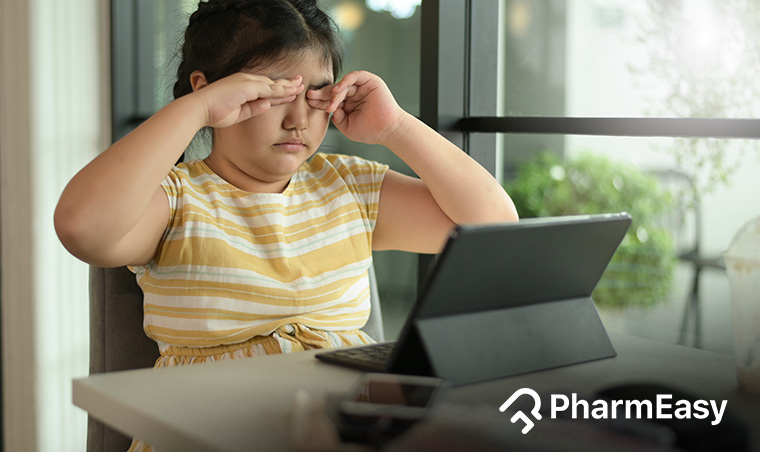Phone Time And Overall Health – What’s The Optimal Screen Time?
By Dr. Nikita Toshi +2 more

Get,

to manage your symptom
Get your,


4 Cr+ families
benefitted

OTP sent to 9988776655



You’ve successfully subscribed to receive
doctor-approved tips on
Whatsapp

Get ready to feel your best.

Hi There,



Register to Avail the Offer
Send OTPBy continuing, you agree with our Privacy Policy and Terms and Conditions

Hi There,

Trusted by 4 crore+ families

OTP sent to 9988776655



You have unlocked 25% off on medicines




Code: NU25

By Dr. Nikita Toshi +2 more
As surviving with sanity becomes more and more challenging in the recent world, people are opting for the easy way out to stay occupied indoors. Spending lots of time watching tv or using phones is causing irreversible negative effects. The pandemic has pushed us into confinement and more than ever we feel the need and dependency on virtual life. Screen time is the total time spent per day in viewing screens such as mobile phones, TV, computer, tablet or any hand-held or visual device.

It is time to ask the question, ”what is the ideal amount of screen time?” Let us find answers to what should an average screen time per day be for children and adults.
Table of Contents
1. Obesity
When you are looking at a screen, you usually remain in a particular position for an extended period of time. This means you have restricted movement and that can increase your risk of obesity. It can further cause chronic issues like heart disease. Being in front of a screen for a long time will likely lead to mindless snacking and usually make adults and children, obese.
2. Insomnia
Prolonged screen time evidently has a negative effect on your sleep. This applies to both children and adults. The blue light emitted by the screens can significantly lower the melatonin levels, a hormone that regulates when you sleep and wake up and this will disrupt your entire sleep cycle.
3. Eye problems
One of the first and noticeable effects of too much screen time is impaired vision. The blue light can prove to be dangerous and eye strain often leads to dry eyes, blurry vision, irritation and burning sensations.
4. Back and neck issues
If you continue to look at your phone, tablet or a tv screen for a really long time, it will put a lot of strain on your neck muscles and your spine. You will experience pain after sitting in a slumped posture for too long. This is common and likely results in frequent headaches and backaches. To avoid these, reducing screen time is a must.
5. Impact on behaviour and mental wellbeing
Excessive screen time can be addictive and has a negative impact on the mental health and behaviour of a person.
Recommended screen time Under 2 years old: Zero screen time, except for video chatting with family or friends.
Dr. M.G. Kartheeka, MBBS, MD
2-5 years old: No more than one hour per day co-viewing with a parent or sibling.
5-17 years old: Generally no more than two hours per day, except for homework. more than 17 years max 3- 4 hrs per day
Excess screen time may slow language development in children and make it hard for your child to sleep at night. Limiting screen time is very essential.
Dr. Ashish Bajaj, M.B.B.S., M.D.
As we talk about the negatives of screen time, you must remember that it is not entirely a negative element. If you maintain the ideal screen time for yourself and train your children accordingly, you can derive several benefits from digital media. It helps you learn and stay connected with friends and relatives. It is okay to include screen time as a part of your daily activities but do not make it the only activity and increase dependency on it.
Disclaimer: The information provided here is for educational/awareness purposes only and is not intended to be a substitute for medical treatment by a healthcare professional and should not be relied upon to diagnose or treat any medical condition. The reader should consult a registered medical practitioner to determine the appropriateness of the information and before consuming any medication. PharmEasy does not provide any guarantee or warranty (express or implied) regarding the accuracy, adequacy, completeness, legality, reliability or usefulness of the information; and disclaims any liability arising thereof.
Links and product recommendations in the information provided here are advertisements of third-party products available on the website. PharmEasy does not make any representation on the accuracy or suitability of such products/services. Advertisements do not influence the editorial decisions or content. The information in this blog is subject to change without notice. The authors and administrators reserve the right to modify, add, or remove content without notification. It is your responsibility to review this disclaimer regularly for any changes.

Leave your comment...
Comments